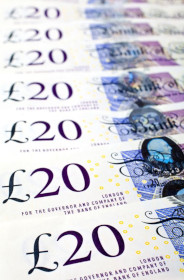The British pound is trading mixed against its G10 currency competitors midweek as investors comb through the influx of April inflation data. For the first time in the nationâs history, the United Kingdom sold a negative-yielding bond, meaning that the government is being paid to borrow. In the post-Coronavirus economy, this might be the new norm for a myriad of nations around the world.
According to the Office for National Statistics (ONS), the consumer price index (CPI) tumbled 0.2% in April, bringing the annualized rate to 0.8%. Consumer prices were flat in March, and analysts had penciled in a decline of 0.1%. The core inflation rate, which strips out volatile food and energy, came in at a four-month low of 1.4%.
The ONS reported that the producer price index (PPI) output for British manufacturers fell 0.7% last month, greater than the median estimate of -0.5%. The PPI input cratered 5.1% in April, worse than the market forecast of -4%. Retail prices were unchanged after edging up 0.2% in March.
On Tuesday, the government confirmed that the number of job vacancies clocked in at 350,000 in April, below market expectations of 750,000. The unemployment rate dipped to 3.9%, but it was better than the 4.4% experts had anticipated. The number of jobless claims topped 856,000, higher than the consensus of 676,500.
Later this week, purchasing managers index (PMI) readings and retail sales data will be published.
The UK Debt Management Office announced on Wednesday that the nation borrowed at a subzero interest rate for the first time. At an auction in the middle of the trading week, the department sold $4.66 billion in three-year gilts at a yield of -0.003%. This means the government is being paid to borrow, but it also means that investors will get back less than what they paid for if they hold onto the bond to maturity.
During March madness, the Bank of England (BoE) slashed its benchmark rate to an all-time low of 0.1%. The central bank also announced it would purchase $250 billion in government debt. The BoE is likely to expand its quantitative easing efforts to ensure borrowing costs are minimal and the government can finance its astronomical level of spending.
Now that the country is auctioning government debt with a negative yield, Great Britain joins Germany, Japan, Sweden, and several other countries.
The USD/GBP fell 0.13% to 0.8151, from an opening of 0.8162, at 14:04 GMT on Wednesday. The EUR/GBP advanced 0.45% to 0.8952, from an opening of 0.8914.
If you have any questions, comments, or opinions regarding the Great Britain Pound, feel free to post them using the commentary form below.

British Pound Mixed on Sliding Inflation, First-Ever Negative-Yielding Bond
More from NewsMore posts in News »


Be First to Comment